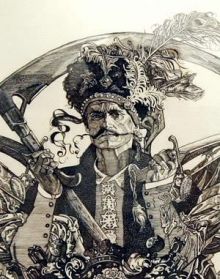While the 300th anniversary of Pereiaslavska Rada was celebrated with pomp and circumstance in the USSR somebody behind the “iron curtain” had to analyze the situation that had led to the known decision made by Bohdan Khmelnytsky and Cossacks’ chiefs and its consequences thoroughly and without any political accusations or labels. One of the striking examples of such polemic reconnaissance is the article “Moscow, Maroseika.”
It is always interesting to read George Shevelov’s works no matter how many years ago they were written. Regardless of decades that have passed they remain surprisingly topical since they touch upon real problems we are still facing: shameless behavior of our northern-eastern neighbors or the Ukrainian politicians or Ukrainian people’s reaction to the current developments. However, they were written in a certain time, in certain circumstances and with a certain purpose. So, they make a part of the historiography of the questions raised by the author and, to some extent, a historical source for their period of time. With the course of time the perception of the problems detected has changed but they have not lost their topicality. Probably, it is regrettable since some of them could have been shelved with the documents.
In the middle of the 20th century Shevelov made an unexpected emphasis: he suggested looking at the events that had happened 300 years ago from the point of the attack of the Ukrainian culture and personal tragedy of its bearers. However, some of his statements, for example, the one that the Ukrainians knew what Moscow was but agreed for Pereiaslavska Rada, seem to be unproved now. The thing is that they understood it too late (especially, the Cossacks’ chiefs). However, even when they realized it the influential part of the society and Ukrainian clergy on the left bank took the approximation to the country where the orthodoxy was the official religion as a reasonable step meeting their own corporate interests. That was the origin of all positions and influence. There also were other corporations: the abovementioned Cossacks’ chiefs, Polish gentry, petty bourgeoisie, and the peasants. Moscow successfully played on their contradictions and gradually realized its own strategic vision of the prospect development of its relations with the Ukrainian Cossacks’ state. There was not any feedback effect in this direction (unlike the culture and education). Has anything significantly changed? Does anyone pay attention to such things?
Shevelov mentioned “kochubeivshchyna” as one of the problems of Ukraine. Probably, from the point of the mid-20th century it was so and this phenomenon is clear but now we can only sympathize with Vasyl Kochubei who gave his name to one of our national characteristics. Back in the middle of the 17th century the French engineer Guillaume de Beauplan sang praise to the Cossacks and at the same time caustically and critically described them.
Ivan Mazepa got his hetman’s mace also because of the intrigue around his predecessor and his chief Ivan Samoilovych. Back then after the unsuccessful Crimean campaigns and making “Eternal peace” the Kremlin found out about some of hetman’s utterances about “silly Moscow.” The illustrious hetman was accused of intentions of treason and stripped of power with the help of Princess Sophia’s favorite Prince Vasilii Golitsyn (thus they found the person responsible for the military failures). Delations were so common in the Cossacks’ environment that Peter the First paid no attention to everything that tainted Ivan Mazepa’s reputation for a while. If we recall that Vasyl Kochubei’s delation was not only a love affair but power struggle using the traditional for the Cossacks’ environment means, was there any significant difference in the actions of both of them?
Probably, we should not leave out the economic component. When hetman Ivan Mazepa died his heirs argued whether his property was personal or state. As a result, the Cossacks’ chiefs decided to give the money to his closest relative, his nephew Andrii Voinarovsky. It means that hetmans, colonels, and lieutenants did not make any difference between the state treasury and their own pocket since there was no any difference. It looked like an anachronism for the beginning of the 18th century. Moreover, only the hetman Danylo Apostol established the exact budget of the Ukrainian Cossacks’ state. Probably, earlier the budget was not that important.
Except for money, the Cossacks’ chiefs received rank lands to fulfill their duties. Then they privatized them by fair means or foul. Their nearly instinctive actions were not left out by the Russian empire and were certainly used for interfering into the internal affairs in Hetmanshchyna and destroying its state institutions. It is no surprise that Peter the First officially grounded the creation of the first Little Russian board by the desire of the Russian authorities to establish order on the Cossacks’ territory against disorder and Cossacks’ chiefs’ abuse. It was supposed to be an instance of control and appeal. However, the attempt of the hetman Pavlo Polubotok to introduce proper order without Petersburg did not last long as he was stopped.
It is clear that it was not that difficult for the Russian empire to liquidate the outdated and corrupt from top to bottom traditional state machine of Hetmanshchyna and create a new one, their machine instead. The history tells that nobody suffered personally because of those extraordinary changes. Only the serfs, petty bourgeoisie deprived of their self-government and the liquidated Ukrainian Cossacks’ state. The complex of provincialism was in it since the timely modernization would have created a slightly different situation. However, who was interested in it compared to mansions, lands, positions, and money?
The problems raised by Shevelov are characteristic for the modern Ukrainian society. They only have another sense and I hope they will be resolved in a different way.







